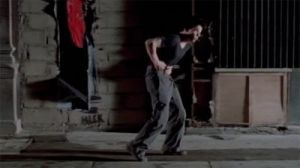STUDIO: Carlotta | DIRECTOR: Leos Carax | CAST: Juliette Binoche, Denis Lavant, Michel Piccoli, Hans Meyer, Julie Delpy, Serge Reggiani
RELEASE DATE: 11/18/14 | PRICE: DVD $29.95, Blu-ray $39.95
BONUSES: Mr. X, a Vision of Leos Carax, documentary about Leos Carax; deleted scene; rushes and outtakes
SPECS: NR | 119 min. | Foreign language drama | 1.66:1 widescreen | Dolby Digital 5.1/DTS-HD Master Audio 5.1 | French with English subtitles
Leos Carax’s films bristle with energy and invention, but they are also melancholy meditations on romance and love in the finest tradition of French literature and cinema. The 1986 film Mauvais Sang, his second feature (title translation: “Bad Blood”), is a caper film that is also a valentine to the costar, Carax’s then-girlfriend Juliette Binoche (Hail Mary, Cosmopolis), and a tribute to the many talents of star Denis Lavant (Age of Uprising: The Legend of Michael Kohlhaas).
The first three films by Carax form a sort of unofficial “trilogy” in which Lavant plays different characters named Alex (Carax’s real name is Alex Dupont) who pine for beautiful women on the streets (and in the tiny apartments) of Paris. The plot of Mauvais Sang appears complicated but is in fact just a distraction (Hitchcock’s “MacGuffin,” if you will), present to spur on the romance between Lavant and Binoche’s characters.
In brief, two groups of mobsters are looking to break into a high-security facility to steal a virus that is sexually transmitted and causes its sufferers to “make love without love.” When mob boss Marc (Michel Piccoli, Belle de Jour) loses a sidekick with the ability to circumvent security systems, he recruits the sidekick’s son Alex (Lavant) to go on the job with him. Alex quickly falls in love with Marc’s moll Anna (Binoche), and the film’s real storyline is set in motion.
Carax’s early films are the closest that modern French film has come to the kinetic spontaneity of the early works of the French New Wave. He emulates Godard’s classic Sixties work in numerous ways, from the fragmentation of actions and images to the ways in which he crafts gorgeous close-ups of Binoche (who looks here uncommonly like Godard’s muse Anna Karina and plays a character named after her).
The casting points both backward and ahead in French cinema. In addition to using fledgling actresses Binoche and a 17-year-old Julie Delpy (2 Days in New York) in the female leads, he harkens back to the great French films of the Sixties by putting the indefatigable Piccoli and screen legend Serge Reggiani (best known to American film buffs for his work with Jean-Pierre Melville) as charming veteran crooks.
Leading the cast is the unknown Lavant, who not only became Carax’s alter-ego in his first three films but also showed himself to be a startling acrobat and fearless as a performer (as he demonstrated in the many roles he incarnates in Carax’s recent Holy Motors). Here he is utterly charming as a sleight-of-hand expert nicknamed “Chatterbox” (because he’s mostly silent). The sequences where he charms Binoche with his magic and, in a bravura set-piece, runs/dances with joy to David Bowie’s “Modern Love,” are dazzling and wonderfully poignant.
This two-disc set contains rare extras, including a deleted scene that gave Piccoli a chance to shine, but would’ve skewed the balance of the film by making him too sympathetically tragic. Twenty minutes of rushes and outtakes are also included — the primary revelation here being that both Lavant and Binoche did their own skydiving for one of the film’s most colorful scenes.
The lengthiest supplement is the feature-length documentary Mr. X, a Vision of Leos Carax. Documentarian Tessa Louise-Salome explores the dreamlike quality of Carax’s films while an array of French and American critics discuss the importance of his work. Most interesting is the praise that comes from Carax’s filmmaker friends (Kiyoshi Kurosawa, Harmony Korine) and his crew members.
Binoche is heard from in file footage, and Carax himself appears to have submitted to one interview for the docu, which is mostly used as a voiceover for certain scenes from his work. Thus Lavant has to serve as the dominant voice of the Carax “experience,” having starred in four of his five features. He maintains that each time he has worked with Carax he has had to learn something physically demanding, be it acrobatics or skydiving.
He also talks at length about the film that sank Carax’s career for nearly twenty years when it failed at the French box office, the now-beloved Les Amants du Pont-Neuf (aka “Lovers on the Bridge” on DVD). In talking about the difficulties he faced on that film Lavant utters the not-very-often-heard sentence, “the first year of shooting was the most grueling” — as the film took three years to shoot and cost over 110 million francs.
Carlotta has released Mauvais Sang in tandem with Carax’s debut film, Boy Meets Girl ($24.95; Blu-ray, $29.95). He was remarkably assured in his approach on Boy…, a film which, even more than Mauvais, is a modern riff on the French New Wave. The film is an episodic romance, following Alex (Lavant) as he wanders from situation to situation and falls madly in love with Mireille (Mireille Perrrier).
Like all of Carax’s films, Boy Meets Girl contains several memorable moments, the best of which is without question the sequence where Alex walks through Paris late at night as he, and we, listen to the lush, early David Bowie song “When I Live My Dream.”
|
Buy or Rent Mauvais Sang
|
|||
|---|---|---|---|
DVD |
 |
 |
|


Leave a Reply